Last Updated: 15/12/2025
When Can Puppies Go For A Walk Outside? A Vet's Guide to Safety and Socialisation
Bringing home a new puppy is exciting, but safety comes first! Our vet explains the ideal age for your puppy's first walk outside, focusing on vaccine protection, parasite prevention, and essential lead training for a lifetime of happy adventures.
Author: Dr Maree Monaghan BVSc (Hons)
Reading Time: 10 minutes - short read
Walking your new puppy outside for the very first time is a milestone moment - a truly exciting start to a lifetime of adventures and bonding! You’ve got the lead ready, the comfy harness is on, and you’re both bursting with anticipation to show your little mate the great big world.
But amid the excitement, one crucial question arises: When is it truly safe to take your furry friend for their first proper walk?
Exposing your puppy to public areas before they are properly protected can put them at risk of serious illnesses like parvovirus.
In this guide, we'll walk you through the non-negotiable vet guidelines, covering everything from the critical vaccination schedule to safe socialisation and preparation tips, so you know exactly when that first outdoor adventure can happen safely.
In this article
- Puppy socialisation: Making friends safely
- Understanding your puppy's vaccination schedule
- When is the right age for your puppy's first walk?
- Safety first: Protecting your puppy from parasites and disease
- Collar, lead, and treats: Preparing for your first walk
- The big step: Your puppy's first short trip outside
- Introducing public spaces and dog parks (with caution!)
- FAQs
Puppy socialisation: Making friends safely

The first 14 to 16 weeks of your puppy's life is their 'socialisation window.' During this critical period, they are most open to new experiences, and safe socialisation is key to helping them grow into well-adjusted canine citizens.
What is Safe Socialisation?
It's about positively exposing your puppy to lots of different:
- Environments and Sounds: Traffic noise, vacuums, different surfaces (grass, pavement).
- People: People of different ages, appearances, and clothing (hats, uniforms).
- Animals: Only healthy, fully vaccinated, and known well-socialised animals.
Crucial Safety Guidelines:
Since this important socialisation window happens before your puppy is fully vaccinated, you must choose locations and interactions wisely to protect them, especially from serious threats like parvovirus.
- Playdates at Home: Organise playdates at your place with healthy, fully vaccinated, and well-behaved adult dogs belonging to friends or family. Always supervise closely.
- Puppies Learn Fast: Remember, puppies learn critical social skills by about 14 weeks of age. Your involvement in guiding their interactions is vital.
- Public Outings: You can certainly take your puppy out in public to expose them to the sights and sounds, but they must always be carried.
- Avoid the Ground: Do not let your puppy walk on the ground or come into contact with unknown dogs until two weeks after they have completed their full course of puppy vaccinations.
For more information about socialisation, read through our article on The Importance of Socialisation.
Understanding your puppy's vaccination schedule
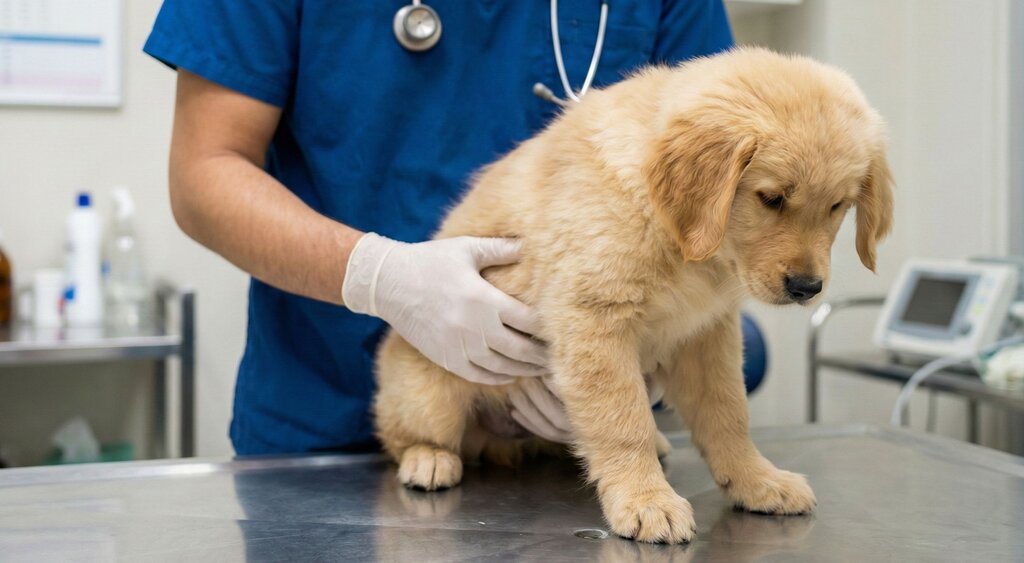
Vaccinations are essential for your puppy’s safety and are the key factor in determining when they can start walking outside.
When do the vaccinations happen?
A typical vaccination course for puppies involves three injections, spaced approximately four weeks apart:
- First injection: Usually around 6 to 8 weeks of age.
- Second injection: Usually around 12 to 14 weeks of age.
- Third injection (Final shot): Usually around 16 to 18 weeks of age.
Keep in mind: This schedule can vary slightly depending on your location in Australia and the specific vaccine protocol your veterinarian uses.
What diseases are they protected against?
In Australia, dogs are routinely protected against several serious diseases:
- Canine Parvovirus
- Canine Adenovirus (Infectious Hepatitis)
- Canine Distemper Virus
- Kennel Cough (Canine Parainfluenza II +/- Bordetella bronchiseptica)
Are there other vaccines?
Additional vaccinations, such as for Leptospirosis, may be recommended if you live in or visit certain risk areas. It's important to consult with your veterinarian for recommendations specific to your pup's lifestyle and local environment.
For more information about vaccinations, read through our Puppy Vaccination Guide.
When is the right age for your puppy's first walk?
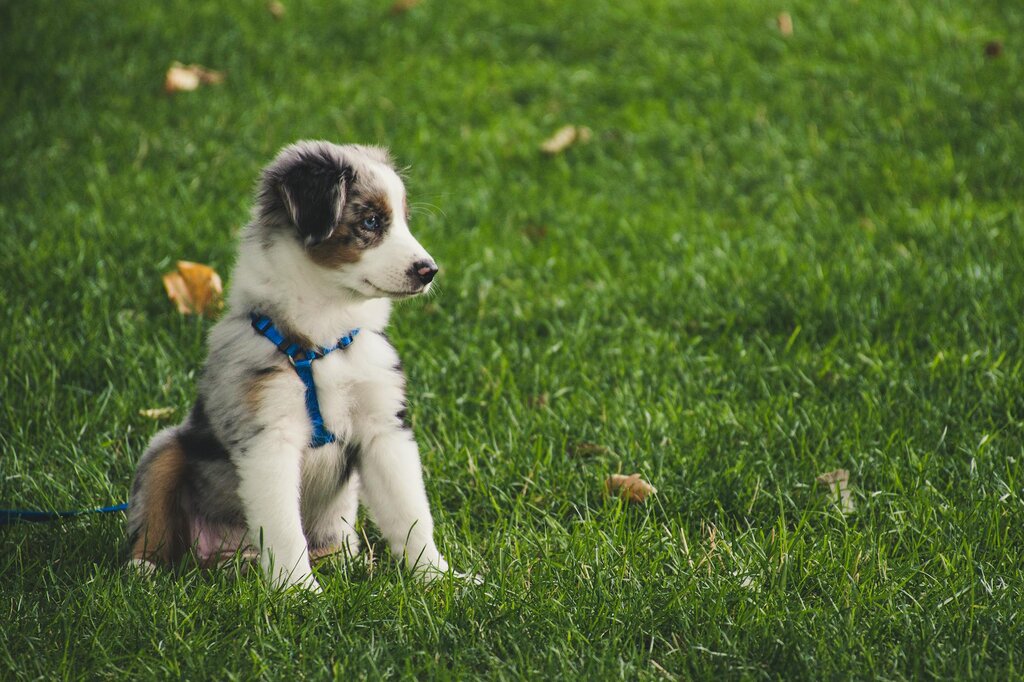
Vaccinations can take up to two weeks to have their full effect so, unless your vet has advised otherwise, avoid taking your puppy out and about, particularly to dog parks, beaches and other dog hotspots until 2 weeks after they have had their final vaccination.
While at your vets, this is a great opportunity to make sure your puppy's microchip details are correct. Microchips are the best way to ensure your puppy will be back home with you quickly if they become lost.
Safety first: Protecting your puppy from parasites and disease
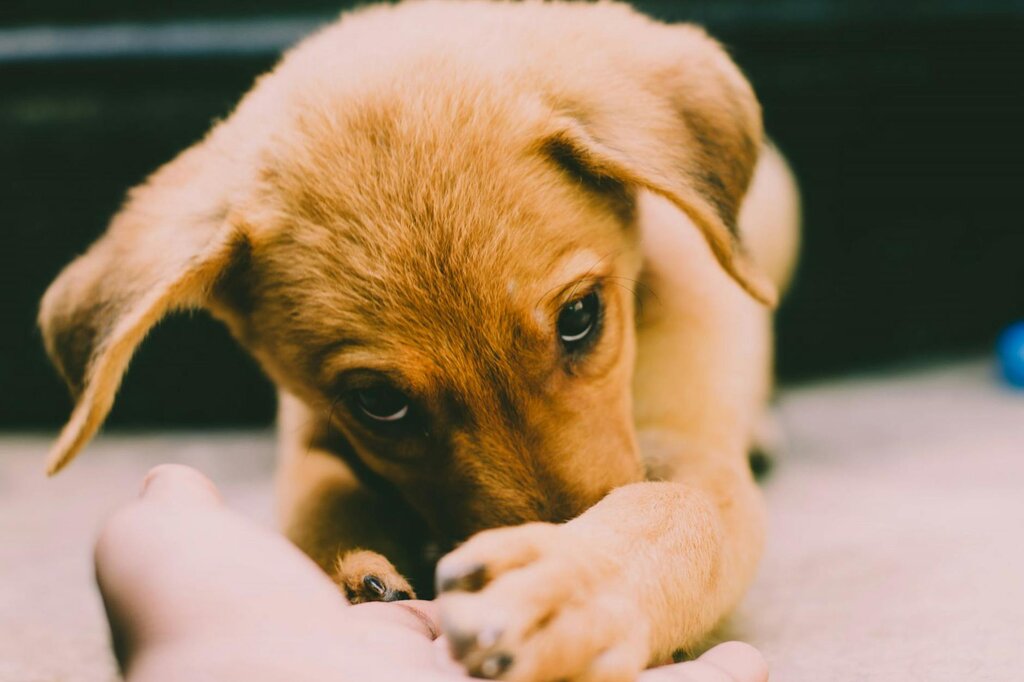
Before you head out on that exciting first walk, there are a few important safety precautions to take.
Talk to your vet first!
It is essential to talk to your veterinary team before your big adventure. They are your local experts and can provide critical, up-to-date information, such as:
- Areas to avoid: Your vet will know if certain local hotspots, like the dog park, have recently had cases of serious infectious diseases, such as Parvovirus or Kennel Cough.
- Tailored advice: They can help you formulate a safe and effective parasite control program specific to the risks in your local area.
The risk of parasites
When your puppy ventures into the big, wide world, they will be exposed to various parasites:
- External Parasites: Ticks and fleas are always present in the environment.
- Internal Parasites: Worms and other internal parasites can be picked up from contaminated soil and water.
A note on safety: These parasites are not only a risk to your puppy's health and wellbeing, but some can also be passed on to humans, meaning your own health could be at risk.
Intestinal Worming Schedule
Your puppy should have already started their intestinal worm treatment at two weeks of age. They require treatment:
- Every two weeks until they are twelve weeks of age.
- After twelve weeks, your vet will recommend an ongoing schedule based on their risk and lifestyle.
For more information, take a read through our guide to How Often Should I Worm My Dog?
Collar, lead, and treats: Preparing for your first walk

While most dogs grow up to love walks, being attached to a collar and lead can feel quite strange or even daunting for a young puppy at first. With patience, consistency, and a positive approach, you'll have your puppy walking confidently on the lead in no time!
The tools you'll need
- Start training with a simple flat collar and a light lead.
- Make sure to stock up on high-value training treats - you'll be using these constantly throughout the process!
- You may also want to look into choosing an appropriate harness as an alternative to the collar for walking.
Training: Three easy steps
- Introduce the collar: Put the collar on for very short periods of time. If your puppy tries to scratch at it, immediately redirect their attention with a game or a short training session to take their mind off it.
- Get used to the lead drag: Once your puppy is comfortable wearing the collar, attach the lead and let it drag behind them while they play in a safe, supervised area (like your backyard). This helps them get used to the weight and feel.
- Start walking alongside you: Pick up the lead and begin training your puppy to walk next to you. Some pups take to it immediately, while others may be more challenging.
The key to success
The secret to happy walking is consistent, positive reinforcement training. Always reward good behaviour! If you run into problems or need extra guidance, consulting a professional certified dog trainer is a great step to set both you and your puppy up for success.
For more information, read about How to Train Your Puppy to Walk on the Lead.
The big step: Your puppy's first short trip outside
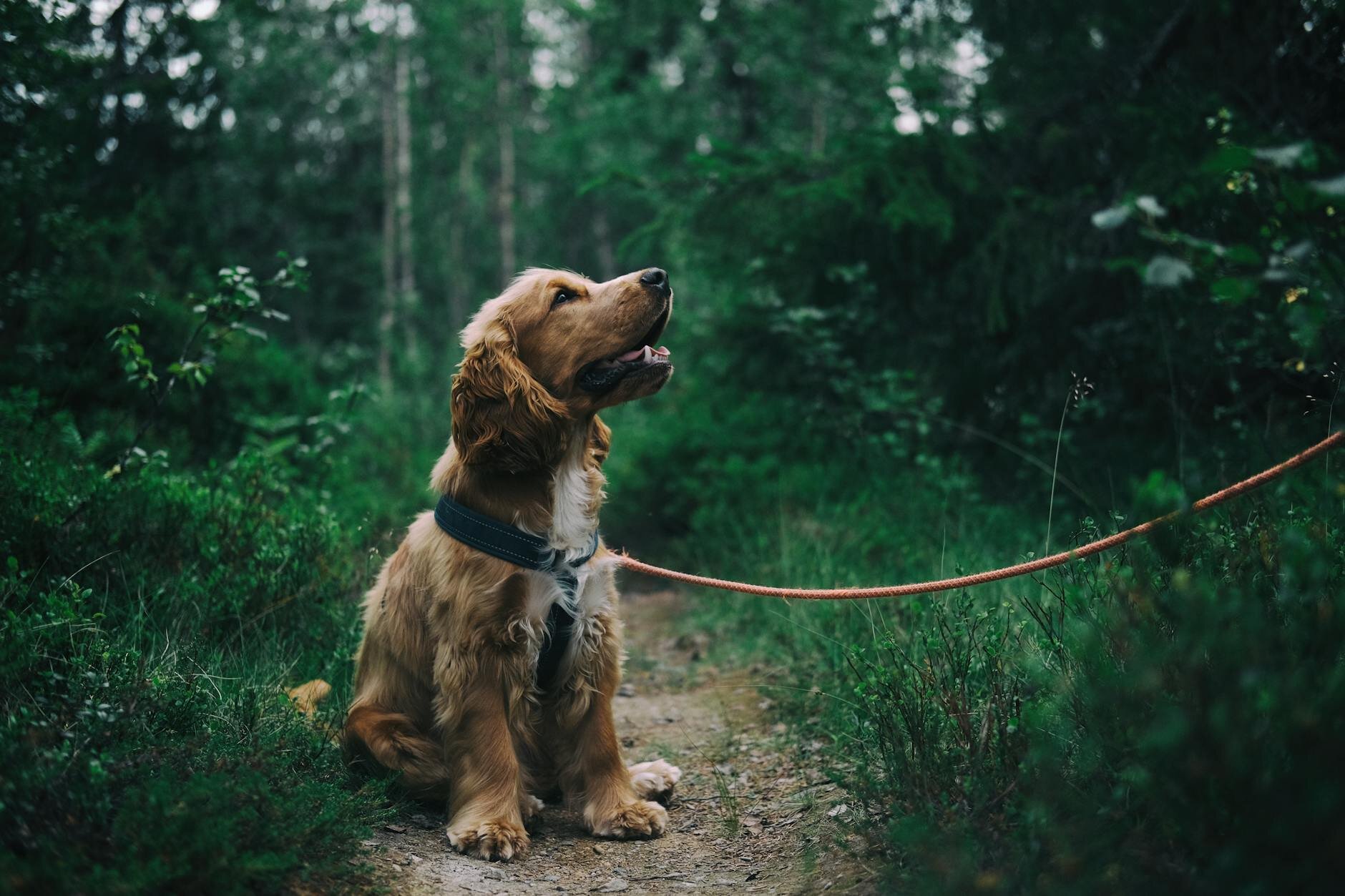
Puppy's first walk can be an overwhelming time very similar to a child's first day at school. Make this walk short and stress free by keeping to a route you are familiar with like along the footpath to the corner of your street and back. Pick a time when there will be the least amount of activity and noise around your pup and don't forget to take plenty of treats! Your puppy's first walk will shape the way they feel about walking in the future so it is critical to make it as much fun as you can.
Baby puppies expend a lot of energy playing and getting into mischief at home so it is not necessary to take them for long walks when you first start out. Be mindful of your puppy's limitations and observe them carefully for any signs of fatigue or heat stress. As your puppy adapts to walking, gradually increase the lengths of their walks by about five minutes per week.
Introducing public spaces and dog parks
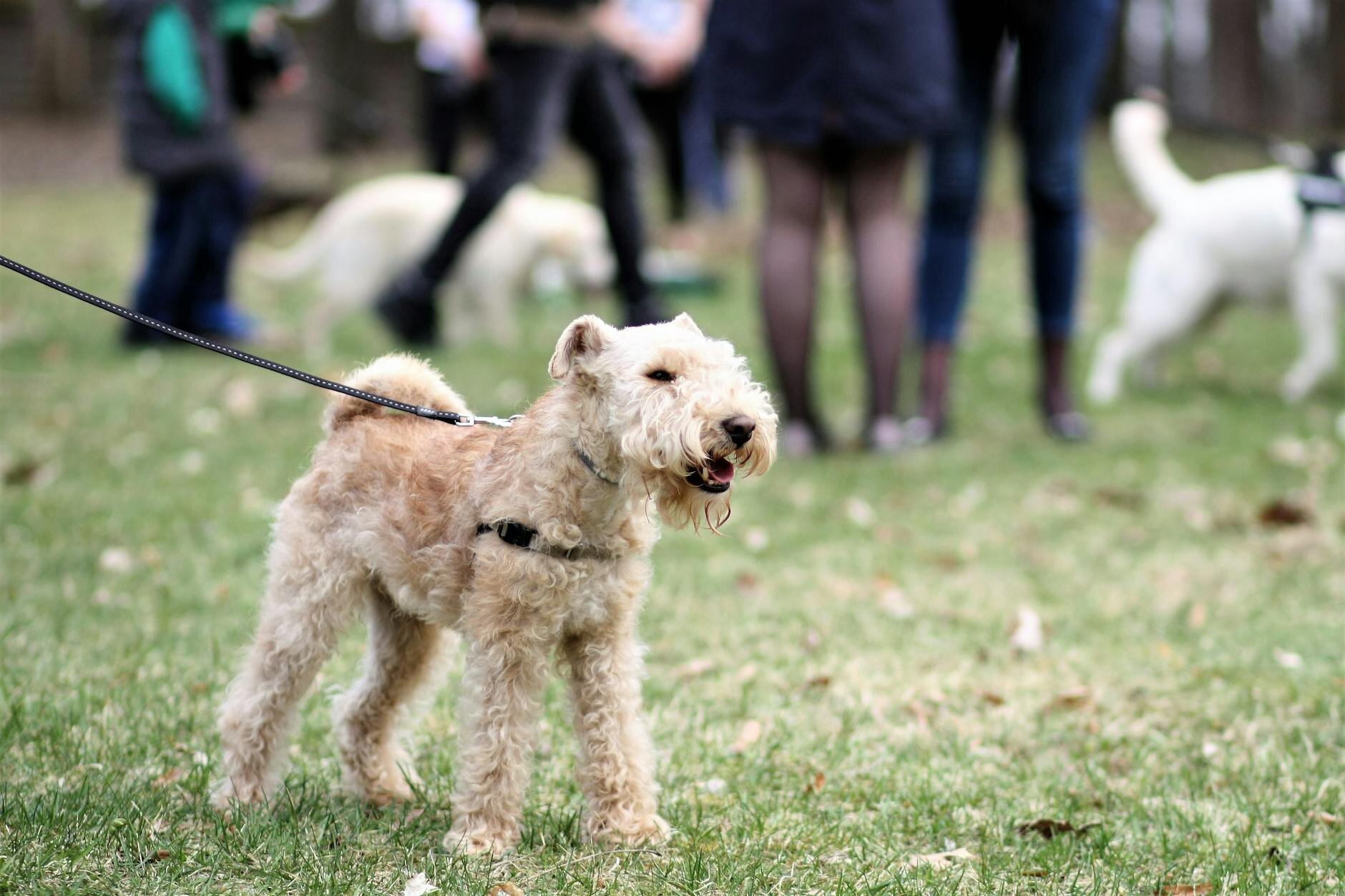
Once your puppy is fully vaccinated, public spaces like dog parks and café strips offer great benefits, including:
- Enrichment: Providing physical and mental stimulation.
- Exposure: Introducing new sights, sounds, and smells.
- Socialisation: Offering chances to interact with various dogs and humans.
Be aware of the risks
Unfortunately, public spaces come with risks beyond just infectious diseases and parasites. You and your puppy could encounter unpredictable behaviour from other dogs and humans, as there’s no guarantee they will be well-socialised or well-behaved.
Safety tips for public outings
To minimise risk and ensure a positive experience, always follow these precautions:
- Do a Risk Assessment: Before visiting any new area, consider - are there any known issues with roaming dogs in the area? What are the very busy times, and can I avoid them?
- Choose Quiet Times: Opt to go out when the area is likely to have fewer people and dogs.
- Stay Vigilant: Be constantly aware of your surroundings and never be distracted from keeping a close eye on your puppy.
- Understand the Energy: Be especially careful in dog parks. They are high-energy, high-arousal environments that can escalate quickly.
Even seemingly tame areas, like suburban streets and urban café precincts, can pose unexpected problems for a young, learning puppy.
For more information, take a read through Are Dog Parks Good for Dogs?
FAQs
Your puppy’s first walk is an adventure worth waiting for! By following your vet's advice on the correct vaccination timeline, implementing a robust parasite control program, and taking the time to introduce the lead calmly, you are setting your puppy up for a lifetime of safe, happy, and confident walks.
Remember to keep those first few trips short, fun, and packed with treats! Happy walking, and don't forget the poo bags!
Articles recommended for you
Our vet authored guide to the benefits of feeding your dog fresh food plus tips and advice for introducing it into their regular menu.
See our guide to protecting your pet from parasites from our vet team.
Thinking of getting a fish? Check out our guide for setting up a tank and home care tips!
Looking to understand horse feeds better? This comprehensive guide covers feeding recommendations for horses of all ages and disciplines.
Does your pet suffer from anxiety? Check out our Vet-guide for treatment options to help your pet.
History
Our experts continually monitor the health and wellness space and we update our articles when new information becomes available.
Tue 16 Dec 2025
Edited by Dr Gillian Hill BVSc (Hons)Dr Maree Monaghan BVSc (Hons)
Veterinarian
Dr. Maree graduated from the University of Queensland in 1990 with a Bachelor of Veterinary Science and has worked in a wide variety of practices around Australia and in Papua New Guinea. She has cared for all creatures great and small and has a particular interest in senior pets and horse nutrition

